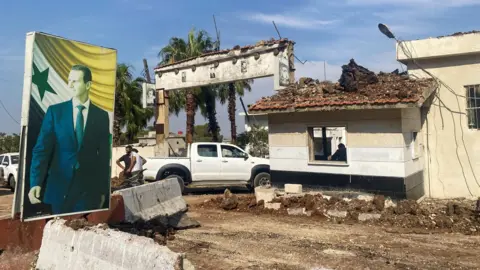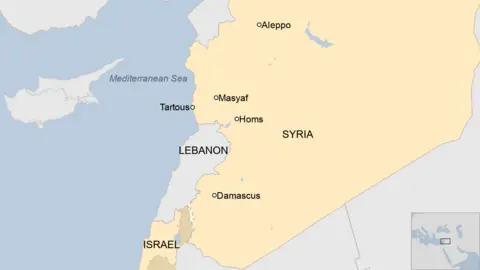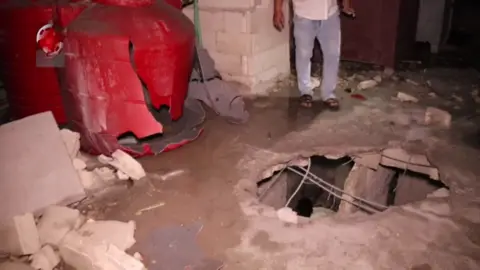Israeli strikes on Syrian military sites kill 18, health minister says
 Reuters
ReutersAt least 18 people have been killed in Israeli air strikes on a number of military sites in central Syria, the Syrian health minister says.
State news agency Sana cited Hassan al-Ghabbash as saying another 37 people were injured in the attacks in the vicinity of Masyaf, in Hama province, on Sunday night.
A UK-based monitoring group reported that 26 people were killed and that the targets included a scientific research centre near Masyaf that was used to develop weapons.
The Israeli military said it would not comment on foreign media reports of the strikes, which Syria's foreign ministry condemned as "blatant aggression" and Iran's foreign ministry called a "criminal attack".
However, Israel has previously acknowledged carrying out hundreds of strikes in recent years on targets in Syria that it says are linked to Iran - Israel's main foe - and allied armed groups.
The Israeli strikes have reportedly been stepped up since the start of the war in Gaza in October last year, in response to cross-border attacks on northern Israel by Hezbollah and other groups in Lebanon and Syria.

Sana's report cited a Syrian military source as saying that Israeli aircraft flying over north-western Lebanon launched missiles at “a number of military sites in the central region” at around 23:20 (20:20 GMT) on Sunday.
"Our air defence shot down some missiles,” the military source added.
The news agency said the strikes also caused damage to the Masyaf-Wadi al-Oyoun highway and that a fire broke out in the forested Hair Abbas area.
Later, the Syrian foreign ministry said the attack had targeted "several residential areas", while local authorities reported that key infrastructure had been damaged, including a fibre optic cable running underneath the highway and a high-voltage power line, according to Sana.
State-run Al-Ikhbariya al-Suriyah TV also broadcast footage purportedly showing a damaged building in the port city of Tartous, west of Masyaf.
The Syrian Observatory for Human Rights (SOHR) - a UK-based monitoring group with a network of sources on the ground - reported that Israeli strikes destroyed buildings and military facilities in "the scientific research area in Masyaf", on the Masyaf-Wadi al-Oyoun highway and in Hair Abbas.
It said at least 26 people were killed, including five civilians, four members of Syrian government forces and 14 Syrians working with pro-Iran groups. Another three bodies were unidentified, it added.
The SOHR said Iranian Revolutionary Guards officers had been stationed in the scientific research area for six years as part of a programme to develop short- and medium-range precision missiles and drones.
However, Iranian foreign ministry spokesman Nasser Kanaani told reporters in Tehran: “We do not confirm what was reported by media outlets linked to the Zionist regime [Israel] about an attack on an Iranian centre or a centre under Iran's protection.”
 Al-Ikhbariya al-Suriyah TV
Al-Ikhbariya al-Suriyah TVA senior regional military source close to Damascus and Tehran also denied a Reuters news agency report which cited two intelligence sources as saying that a major military research centre for chemical arms production was hit several times.
Western intelligence agencies have previously alleged that a branch of the Scientific Studies and Research Centre (SSRC) near Masyaf has been used to produce chemical weapons in violation of the Chemical Weapons Convention.
The Syrian government has denied the claim. However, the facility was reportedly targeted in a suspected Israeli strike in September 2017, a day after a deadly chemical attack on a rebel-held town in northern Syria that the UN and Organisation for the Prohibition of Chemical Weapons concluded was carried out by the Syrian air force.
According to the SOHR, Israeli air and artillery strikes have targeted Syrian territory on 64 occasions since the start of the year, resulting in the damage or destruction of about 140 targets, including weapons depots, vehicles and Iran-backed militia headquarters.
The strikes have killed at least 208 fighters - including 46 members of Syrian government forces, 43 members of Hezbollah and 24 Iranian Revolutionary Guards - as well as 22 civilians, the monitoring group says.
In April, Iran accused Israel of carrying out an air strike on a consulate building in Damascus which killed two senior Revolutionary Guards commanders.
Iran retaliated by carrying out its first direct military attack against Israel. It launched 300 missiles and drones, but almost all of them were shot down by Israeli and US-led forces.
